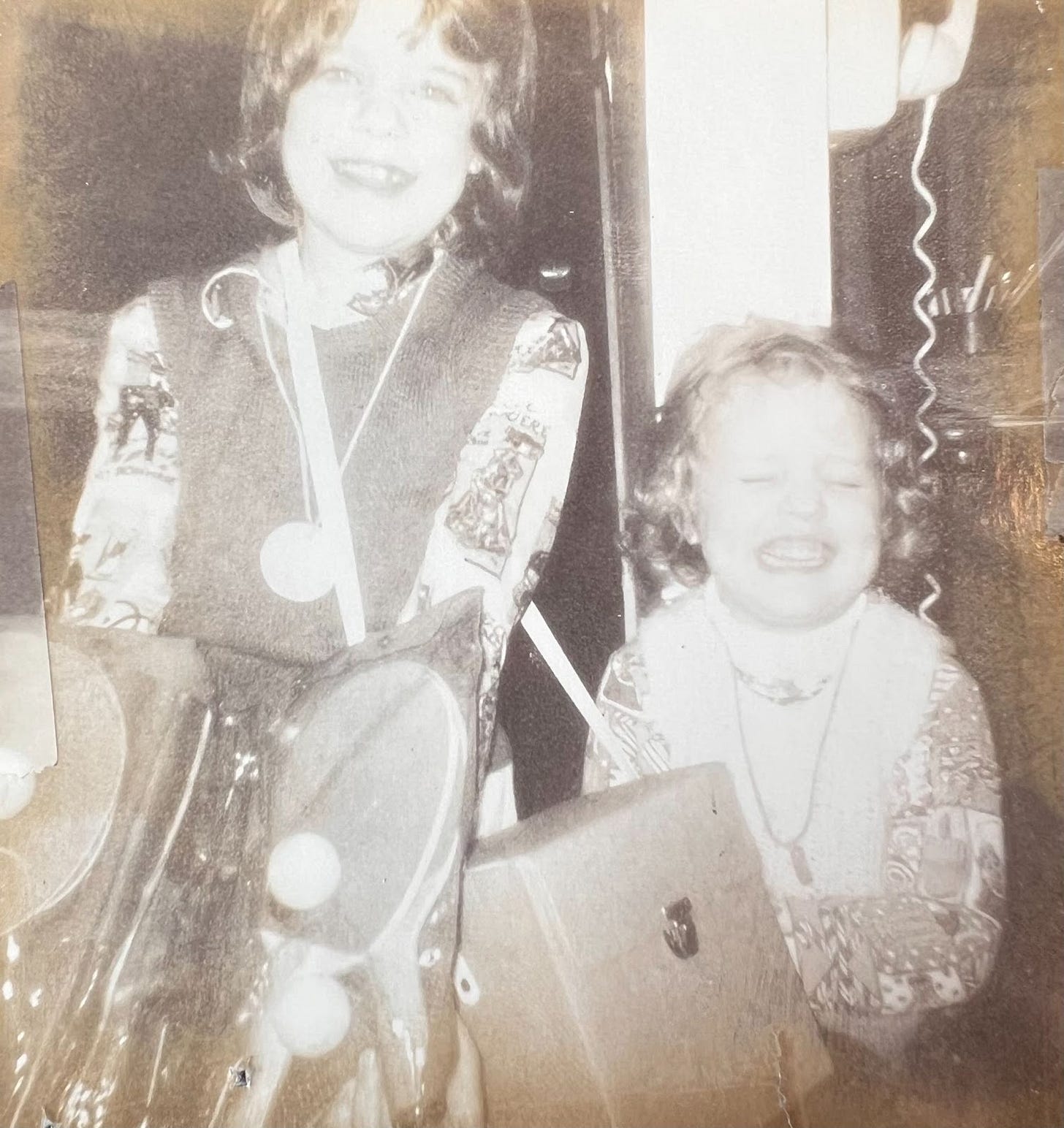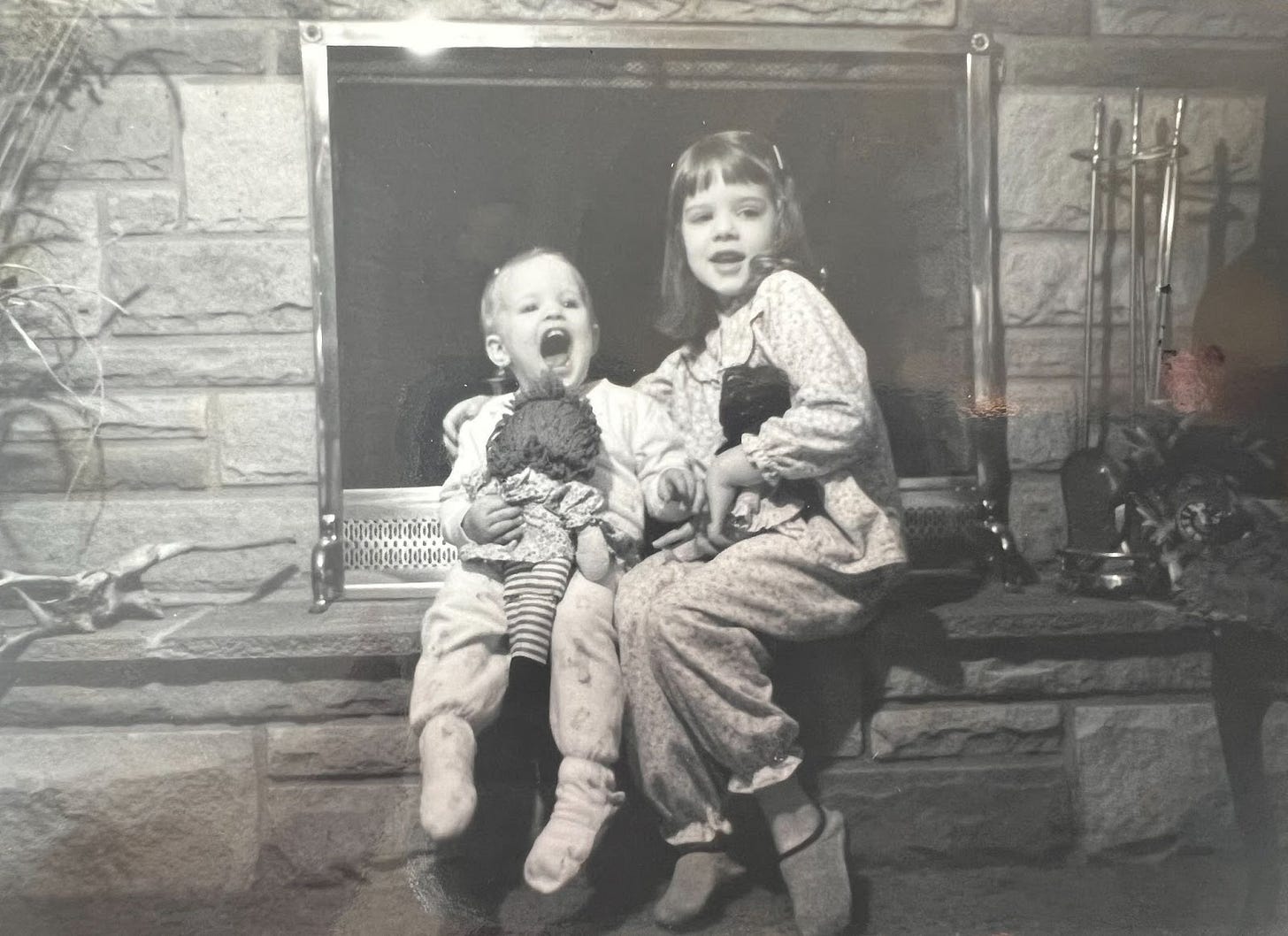If you read “Did You Let Me Win?”, you already know the ghost: the little girl who didn’t trust the good things; who needed her wins to come with blood, or they didn’t count; who carried the ache of almost believing she was enough—if only she could prove it.
Here’s the part of her story that came first, the part that didn’t need to be earned because some stories don’t begin with pain.
Some begin with grass-stained knees.
Before I knew words like ambition or achievement, I knew how to fly—legs pumping hard on the backyard swingset, sneakers kicking toward the sky, certain I could reach it. Not performing. Not trying. Just… Being.
And for a while, that was enough.
I had a dad who sat on the floor and played board games with us like it mattered. I had a mom who made sure I was well-rested and my body was nourished—always. No snacks. No fuss. Just solid, grounding meals, three times a day. And I had a sister I admired and who made me laugh.

My First Definition of “Safe”
Just inside the front of the house, past the porch and tucked beneath the trees, was the den–a dark, tree-shaded alcove tucked into our house like a secret– where the TV lived. Where my sister and I would sit on the hearth of the fireplace, close, as the screen flickered and the world slowed down.
We watched Little House on the Prairie and The Waltons—stories full of simpler times and strong families and quiet evenings that looked a lot like ours.
And it just felt so… safe.
The den didn’t ask me to be impressive; it didn’t expect brilliance.
It just held us.
That room knew how to keep us close—without performance, without noise. Just a family, two sisters, a warm hearth, and a kind of peace I didn’t yet know how to name.

Sometimes, mostly when Mom wasn’t looking, we’d ride our bed pillows like sleds down the carpeted stairs—squealing, crashing, laughing—joy in motion, rule-breaking in its gentlest form.
Even mischief felt safe.
And then there were the make-believe games—still full of joy, just a different kind…
At our babysitter Kate’s house, we played church, just the three of us—Kate, my sister Jen, and me. Kate was the organist at our actual church, the one we attended every Sunday, and when we played church, she’d sit at the piano in her home and accompany our make-believe service. Jen and I took turns preaching. I couldn’t read yet, but I’d open the Bible in my lap and pretend to read scripture—sounding out made-up verses with all the seriousness I could muster.
We sang.
We laughed.
We believed.
It was pretend, yes—but not fake. Something sacred, even in play.
Going to Kate’s was always a treat, and we didn’t want to leave.
When our parents came to pick us up, we’d lie still on the couch, eyes clenched shut, pretending to be asleep, hoping they’d find it rude to wake us and let us stay. We didn’t realize we were small enough to be carried.
So they lifted us...
Back to the car.
Back to our den.
Back to the place where we were safest.
Back to the people who loved us most.
We didn’t need to stay where joy was happening. Joy would follow us home.
And love would always come get us—whether we were playing, pretending, or asleep.
Our parents did the carrying then.
They lifted us from playtime to bedtime, from Kate’s couch to our own beds—because they knew where we belonged.
Because they wanted us safe.
Because love, at its best, doesn’t wait for you to ask for safety.
When We Forgot The Way
But then life happened.
We got taller. And busier. And sharper with ourselves. We learned words like pressure and performance. We stopped asking to be carried.
Somewhere along the way, we forgot how to come home on our own.
We traded our joy for strategy.
We traded rest for relevance.
We started measuring our worth in output, outcomes, and other people’s approval.
And we wandered.
Not because we failed.
But because that’s what grown-ups do.
And “The Leadership Compass”?
It’s how we find our way back.
Not to childhood; not to nostalgia– but to the truest part of ourselves that never left.
The Compass isn’t a return to being taken care of.
It’s a return to the kind of care you now know how to give yourself.
It helps you lift what matters.
And set down what doesn’t.
It helps you remember how peace feels—so you can choose it again.
It helps you carry yourself
back to the swingset,
back to the den,
back to joy that doesn’t need to be earned
and clarity that never once abandoned you.
And the girl on the hearth?
She still believes the world is not a scary place; that it is for her—not against her.
She knows she doesn’t have to pump her legs so high anymore, past the danger zone, to prove she belongs in motion. She knows the swingset won’t tip. She trusts the ground now.
She knows she is surrounded; held by the people who matter.
The other stuff? It’s just noise.
The Compass returns you to your voice, not the loud one.
The true one.
The one who’s been here the whole time, waiting for you to come home.
Coming Soon: The Lead Yourself First Series
This isn’t the whole story. It’s the beginning of one.
In the coming weeks, I’ll be sharing a new series for paid subscribers called Lead Yourself First (LYF). It utilizes “The Leadership Compass”—a guide I created to help you understand what it means to lead yourself first– while in motion.
If you’ve ever wondered how to move from self-doubt to self-trust…
If you’ve ever felt like your success didn’t “count” because it came too quietly…
If you’re ready to lead from clarity, not exhaustion—this series and the “Compass” is for you.
Lead Yourself First: The Compass as a Fundamental
In my own life, I’m returning to fundamentals.
In training.
In nourishment.
In rest.
In how I move, how I eat, how I think, how I lead.
2025, for me, is the year of economy—not as restriction, but as refinement.
A stripping-away of what doesn’t fit.
A reclamation of what’s always worked.
A deeper trust in the basics that hold me.
The Compass is one of those fundamentals. It brings you back to yourself—quietly, clearly, and without performance.
It reminds you that you don’t have to earn your way into enoughness.
You only have to believe you’re enough—and live like you do.
At its root, The Compass is about persuasion, but not the external kind– the internal kind. The kind that says: You already know. You already are. You can trust what’s true.
The Compass isn’t a promise that everything will fall into place. It’s not a guarantee of wins or a roadmap to ringing the bell. And it’s certainly not a prerequisite for doing big things with your life.
It is a foundation.
Once you know how to return to yourself—how to anchor, listen, and believe—you stop outsourcing your clarity. You stop wobbling so hard every time the world gets loud. And the decisions you make? They come from a grounded place, not a panicked one.
Get the Compass + Series Access
This week, current paid subscribers will receive a visual of “The Compass”—a simple, beautiful starting point for what’s to come.
The Lead Yourself First (LYF) series will unfold slowly and intentionally over the next few posts, available only to those inside the circle. You’ll begin to see how it all fits together.
If you’re not yet a paid subscriber, now’s a beautiful time to step in.
Because this isn’t just a series.
It’s a return.
To yourself.
And to the LYF you were meant to live.



